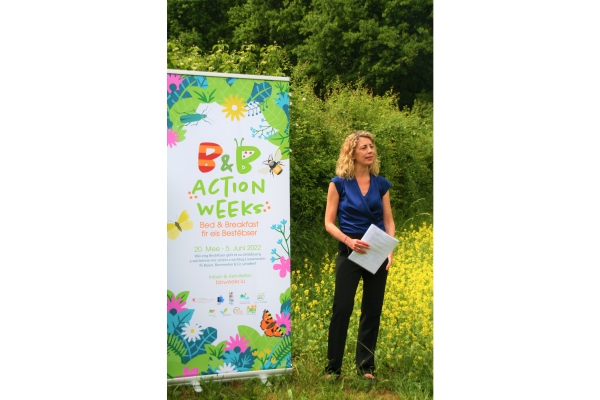 Joëlle Welfring, Minister for the Environment, Climate and Sustainable Development;
Credit: MECDD
Joëlle Welfring, Minister for the Environment, Climate and Sustainable Development;
Credit: MECDD
On Friday 20 May 2022, on the occasion of World Bee Day, Luxembourg's Minister for the Environment, Climate and Sustainable Development, Joëlle Welfring, presented the key elements of the action aimed at preserving and promoting wild bees, butterflies, hoverflies and other pollinators on national territory.
The “B&B Action Weeks”, taking place from Saturday 21 May to Sunday 5 June 2022, is an awareness campaign accompanied by numerous activities on pollinators throughout the country. The ministry promoted five simple actions that anyone can take to help the cause.
context
Almost empty shelves in supermarkets, the vertiginous decline of more than 80% of wild flower species, these would be just some of the catastrophic consequences that the disappearance of pollinating insects would have in the world and also in Luxembourg. Pollinating insects play an essential role in our ecosystems and the monetary value of the pollination service they provide each year is estimated at more than €150 billion worldwide.
In order to halt the decline of pollinating insects, in 2021 the government adopted a national action plan aimed at preserving and promoting:
- wild bees: 346 species described in Luxembourg
- butterflies: 89 species described in Luxembourg,
- hoverflies and other pollinators on national territory
B&B Action Weeks
The plan is based on three main pillars:
- the protection, conservation and management of pollinators,
- improving knowledge about these insects and
- training, knowledge sharing and raising awareness.
As part of this action plan, the Ministry launched on 20 May 2022 the first edition of the "B&B Action Weeks", a campaign aimed at making people discover the diversity of pollinators in Luxembourg to a wide audience and to encourage everyone to help save these fascinating and essential animals for healthy ecosystems.
Until 5 June 2022, activities on pollinators will be offered across the country by many actors in the field of nature protection.
Five call to action
As part of this campaign, the ministry is also promoting five simple actions that everyone can implement in their garden or any other green space they manage:
- Plant more flowers, shrubs and trees
- Let the vegetation grow wilder
- Mow the grass less often
- Do not disturb insect nests and hibernation sites
- Don't poison nature
Concrete examples to illustrate plants that are particularly attractive to pollinators such as comfrey, thyme or even fruit trees were presented by natur&ëmwelt experts. These experts also outlined the basic principles for providing pollinators with adequate shelter to ensure their survival and that of their offspring.
Eventually there was a call to tolerate wasps in his garden as well. These insects indeed pollinate many flowers and constitute moreover a real sanitary police of the ecosystems. Under no circumstances should biocides be used to get rid of these insects; it is better to resort to methods that the actors of the network of specific consultants for wasps can provide to anyone interested.








